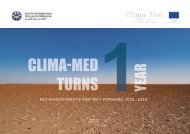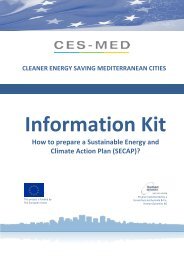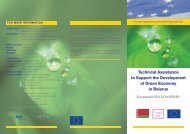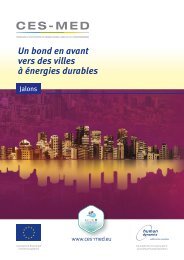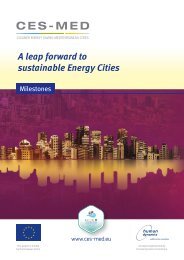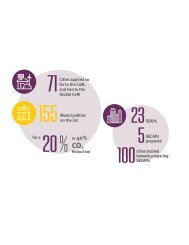171117_SECAP of Greater Irbid Municipality_SET_rev2
Create successful ePaper yourself
Turn your PDF publications into a flip-book with our unique Google optimized e-Paper software.
Priority Action Fiche #5<br />
Title: Shuttle Bus<br />
Background<br />
Express bus service is a type <strong>of</strong> fixed route that typically picks up passengers from<br />
park-and-ride lots in suburban areas and takes them to a central urban location. This<br />
transit service usually operates for longer-distance trips on a Saturday through<br />
Thursday, peak commuter time schedule.<br />
These commuter routes have limited stops, typically travel non-stop on highways<br />
(utilizing any available High-occupancy vehicle (HOV) lanes), and terminate at the<br />
central business district in the city. Fares for the service may be comparable to parkand-ride<br />
fares, slightly higher than typical local fixed route service<br />
Adequate planning is the most important thing to consider when implementing an<br />
express bus route. Before implementation, planners should collect demographic and<br />
regional data prior to route planning.<br />
Data collection involves origin and destination surveys, mapping <strong>of</strong> major<br />
employment centres, and service attractors, survey the potential users to determine<br />
schedules and routing, and should typically <strong>of</strong>fer service in conjunction with one or<br />
more park-and-rides.<br />
Careful required planning, especially in areas <strong>of</strong> high transit demand during peak<br />
periods. Vehicle size should be taken into consideration during planning; larger<br />
vehicles should be assigned to the routes with the highest demand.<br />
Description <strong>of</strong> the action<br />
The main action concentrates on creating Express bus, wraps around <strong>Irbid</strong> hill and<br />
downtown.<br />
But before that, it is recommended to ensure the action will be the right solution.<br />
Thus the following basic steps <strong>of</strong> actions should be taken prior to implementation:<br />
1. Establish Board committee to follow up the preparation for the action with<br />
representative <strong>of</strong> local and national level with stakeholders.<br />
2. Proposal Development<br />
- Service analysis— collect demographic and regional data prior to route planning and determine whether express<br />
bus service is needed or would be a good fit for the area;<br />
- Initial concepts—provide basic schematics on proposed routing and scheduling. Review <strong>of</strong> customer and operator<br />
input and comments to determine if there has been demand in a specific area for express level service. Based on<br />
the comments, refine the design and schedules; develop costs for service based on hours <strong>of</strong> service needed to run<br />
route.<br />
- Initial proposals—selection <strong>of</strong> proposed route(s) and schedule(s) with internal stakeholders (marketing,<br />
scheduling, and operations).<br />
- Community outreach (riders, general public, advisory committees, etc.)—take proposals to advisory groups and<br />
targeted populations the route(s) would serve to gather feedback. Hold meetings in central locations accessible<br />
by public transit to gather additional feedback. Then revise proposals based on all information gathered.<br />
3. Board Process<br />
- Board committee review—present initial proposals and community feedback received to board work session or<br />
board planning committee.<br />
- Public hearing—hold separate public hearing for last-round <strong>of</strong> comments.<br />
- Final recommendations—present final proposal and recommendations for service to transit board <strong>of</strong> directors.<br />
- Board decision—transit board <strong>of</strong> directors approves or disapproves service.<br />
4. Implementation Preparation<br />
- Schedule development—if service is approved, schedules are tested and finalized.<br />
- Operator work assignments—route is presented for operator bidding at the next work assignment period.<br />
147<br />
Mitigation<br />
MWh/a t CO2/a<br />
13,989 3,604<br />
Contribution for<br />
2%<br />
Cost <strong>of</strong> Implementation<br />
1,750,000<br />
Involvement<br />
<strong>of</strong> Stake<br />
Holders<br />
Staff<br />
Capacity<br />
LA<br />
External<br />
H<br />
H<br />
Other H<br />
L M H<br />
Years <strong>of</strong> Implementation<br />
Key performance Indicator<br />
Number <strong>of</strong> Buses<br />
Measurement Units<br />
Percentage <strong>of</strong> occupancy<br />
Area <strong>of</strong> intervention<br />
Improvement <strong>of</strong> logistics and<br />
urban freight transport<br />
Policy Instrument<br />
Integrated ticketing and<br />
charging<br />
Origin <strong>of</strong> action<br />
LA<br />
Priority <strong>of</strong> action




